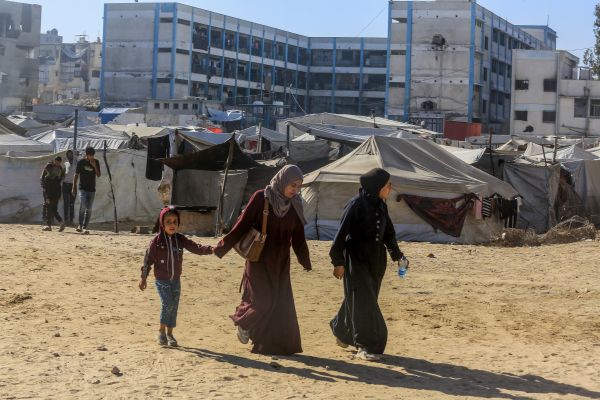It’s been 25 years since the UN Security Council adopted the women, peace, and security agenda (WPS). The WPS agenda sought to radically transform conflict and peacebuilding. It put mechanisms in place to ensure the full and meaningful participation of women in all levels of decision-making, protect women and girls from sexual and gender-based violence, prevent and prosecute violence against women and violations of international law, and ensure gender-responsive relief and recovery for women and girls living in conflict and crisis.
25 years on, the WPS agenda is on fragile ground. The world is experiencing the highest number of conflicts since 1946, record levels of displacement, and a growing backlash against gender equality, international law, and humanitarian principles. The UN Secretary-General’s annual report on WPS paints a bleak picture: Despite progress, 676 million women and girls lived within 50 kilometers of a deadly conflict in 2024, the highest recorded number in 30 years. Cases of conflict-related sexual violence documented by the UN have increased by 87% in just two years.
Gaza and Sudan Reveal Alarming Trends
Over the past two years in Gaza and Sudan, gross violations of international law have created extreme humanitarian need—with a growing body of legal experts determining that genocide is occurring in both places. In Gaza and Sudan, unprecedented percentages of the population have been displaced, civilian infrastructure has been deliberately destroyed, starvation has been used as a weapon of war (resulting in famine), and attacks on humanitarian and medical facilities have decimated some of the last remaining lifelines for communities.
Sexual violence has been used extensively as a weapon of war in Sudan, predominantly by the Rapid Support Forces (RSF), but also by Sudanese Armed Forces (SAF). The UN reports a 288% increase in demand for life-saving support by survivors of rape in the first year of the war alone. Meanwhile, in Gaza, a recent UN independent commission found that Israel’s deliberate targeting of sexual and reproductive healthcare in Gaza has caused unprecedented harm to Palestinian women and girls. WRC’s research in Gaza and Sudan has documented how conflict and displacement crises disproportionately leave women and girls overburdened and at risk. High rates of killing, displacement, and family separation have led to a dramatic rise in women-headed households. Women are now increasingly responsible for protecting and providing for a growing number of dependents, despite facing greater risks of violence and being systematically excluded from inaccessible, insufficient, and unsafe humanitarian aid systems. In Gaza, one widow told us how she and her children went five days without food because she could not push through the crowd at a distribution point. In Sudan, a young midwife, who was the primary breadwinner for her family, told us how the injuries she sustained from sexual violence meant she could no longer work or provide for her family.
The challenges facing the WPS agenda were brought into sharp relief this October in both conflicts. A ceasefire agreement in Gaza came into force seemingly without any participation from Palestinian women or any thought for their inclusion in the future reconstruction or governance of Gaza. Further, more than 200 Palestinians have been killed by Israeli attacks since the ceasefire came into effect—more than 100 in a single night, the majority of whom were women and children.
Meanwhile, Sudan has seen a devastating escalation of violence—much of it gender-based—following the RSF takeover of El Fasher in recent weeks. Evidence indicates that RSF militants engaged in war crimes and crimes against humanity, including widespread executions, gang rapes, and mass killings. Tens of thousands of people—the majority of whom are women and children—have fled El Fasher in the past week, risking rape, extortion, and violence en route as they attempt to find safety.
Protecting the WPS Agenda Is Critical To Protecting Women and Girls
The experiences of women and girls in both Gaza and Sudan are, tragically, pervasive in conflict and displacement crises across the world—from Afghanistan to the Democratic Republic of Congo (DRC), Myanmar to South Sudan, and beyond. Our research and upcoming report on the DRC provides more evidence of the unique risks that women and girls face during armed conflict.
Governments and civil society must act urgently and decisively to protect and uphold the WPS agenda. The global community must redouble commitments to women, peace, and security; defend and advance gender equality and women’s rights; protect and invest in independent gender-responsive humanitarian action; uphold international law and ensure perpetrators are held accountable; support local women-led civil society organizations; and champion women’s full, equal, and meaningful participation in peace processes, recognizing that a “peace” that excludes women is not a true peace at all. When global mechanisms designed to advance human rights, gender equity, and sustainable peace are ignored with impunity, women and girls bear the greatest harm.
Women and women-led organizations are at the frontlines of protecting their families, healing their communities, and building peace. In Sudan and Gaza, local women-led response efforts have been a lifeline for women living on the edge of survival. Many of the women we’ve worked with still express hope for a just and peaceful future. As a pregnant woman in Gaza told us, “God willing, the war will end, and better days will come for all of us. I pray for peace, food, and dignity. I pray to live again.” It is for women like her that we must take urgent action to reverse the backsliding on the WPS agenda.


